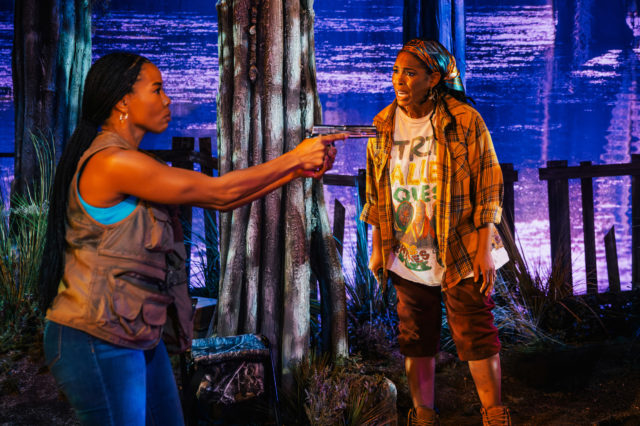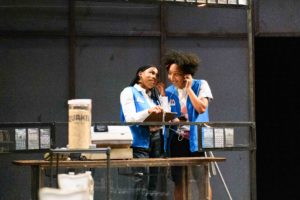This post was updated Feb. 29 at 9:13 p.m.
Warning: spoilers ahead.
“Black Cypress Bayou” poignantly dives into a chilling river of ancestral history.
Written by Kristen Adele Calhoun and directed by Tiffany Nichole Greene, the contemporary drama follows a mother and her two daughters as they grapple with the ghostly horrors of the present, the past and the future. The play opened Feb. 10 at the Geffen Playhouse, where it will run until March 17. While its immersive setting and tear-jerking theme promise success, botched dialogue delivery and inconsistent plot lines dampen the play’s far-from-mainstream message.
On entry, audiences are welcomed into a curiously humid theater with the stage envisioning a quiet enclave by the Black Cypress Bayou, a river flowing through Texas. The scenic designer Lawrence E. Moten III exceeds expectations: The ferns and moss hanging off the ceilings are fittingly complemented by yellow light filtered through the trees. The detailed visuals immediately situate the audience and happily align with the ivy-adorned exterior of the Geffen Playhouse. As cool mist pours down, audiences find themselves scanning for imaginary flies.
[Related: Theater review: ‘POTUS’ dishes up sharp comedic performances but ultimately dull satire]
One of the most appealing features of the show is the palpable chemistry between the three lead actresses, who each add their own presence to the stage. The mother, Vernita Manifold (Kimberly Scott), is an immaculate balance of nurturing and sass. She makes an impression as soon as she enters, mysteriously covered in blood. While she mocks her daughter LadyBird Manifold (Brandee Evans) for her uptight, painstakingly organized mannerisms, she also surprises audiences with her tenderness and emotional attitude when describing her traumatic past.
RaeMeka Manifold-Baler (Angela Lewis), the younger daughter, arguably has the best on-screen presence. Her quirky antics and humorous quips embody the familial bond, capturing the tumultuous bond between loving and despising one’s family. Throughout the play, the three characters are so convincing that viewers will find it hard to believe the actors are not related.
Though the story starts with lighthearted humor and subtle jabs at “white folk” behavior, it takes an ominous turn when Vernita reveals the dismantled head of Clayton Rutherford, the richest man in East Texas. Thus begins a gripping path to determine the truth of his murder and the historical trauma that is intrinsically linked to his name. Delving into the women’s ancestral stories, the play brings out the pain of Black subjugation and how historical prejudice seeps into their lives today. The characters raise critical issues of job layoffs and labor laws during the pandemic that are innately linked to racist mindsets. Furthermore, when wrestling with Rutherford’s murder, the women refer to the police as the “death squad,” a poignant commentary on police brutality.
The play reveals a spiritual and personal facet when a mysterious security guard, Taysha Hunter (Amber Chardae Robinson), arrives on the scene. With her comes an entourage of secrets, the consistent truth of the entire story, and a glimpse into the spiritual nature of the bayou – a theme throughout the play. Scott does a spectacular job illustrating the cultural significance of nature and its immense healing power, a contrasting perspective to the reliance on medicine during the pandemic.
The four women go on to highlight the struggle of land ownership faced by most Black families in the town, narrating the horrific story of how Rutherford’s family robbed their ancestors of their hard-earned land. Though fictional, their story rings true to America’s dark past of racial colonization, revealed in Vernita’s heartbreaking statement: “Our people never own nothing down here.” Themes of discrimination and the burden of ancestral pain come to a head in the notion of retribution – a plea to be acknowledged and do right by their ancestors’s legacy in the current world. The hard-hitting dialogue and nuanced acting pull at many heartstrings, eliciting deep sighs and nods of agreement from the audience.
[Related: Emmys 2024: Alumnus Jerry Henry shares his experience working on ‘The 1619 Project’ docuseries]
Despite the pertinent themes and immaculate dialogue, the show is far from perfect. Perhaps the largest criticism is of the flawed delivery, specifically Scott’s. She often fumbles over and stutters at her cues, which severely damages the pace of the play and debilitates the emotional build-ups to crucial themes. For instance, when one of the characters confesses to the murder, the choppy dialogue delivery nearly overshadows this key plot point. Moreover, the characters are selectively expressive – bringing out their stellar acting when they have dialogue but otherwise resorting to blank expressions.
Another weakness emerges in the musical score from Everett Elton Bradman. Though reminiscent of Black culture, from hip-hop to reggae tones, the abruptness and awkward timing of such musical vignettes disrupt rather than facilitate the plot’s flow. Oftentimes, during a series of banter between the characters, the score is absent altogether, leaving a sense of stagnancy that the actors struggle to fill.
Beyond dialogue and music, the play’s plot is jerky and inconsistent. Though it begins with a steady pace, fleshing out the character dynamics and building up to the climax of Rutherford’s decapitated head, it soon settles into a rushed, confusing rhythm. For instance, within a span of 20 minutes, both daughters admit to murdering Rutherford, belittling the shocking effect that each reveal warrants. The play concludes with a glimpse into a positive future, with hardly any explanation or connection to how this future came to be. Hence, rather than taking audiences on an immersive 80-minute journey with the Manifold family, the show seems to cram as many plot points and themes into the short runtime as possible – leaving audiences to play catch-up.
Ultimately, the relevant themes of ancestral trauma and racial debilitation are dulled by an overachieving plot line, which gradually loses its grip on the audience. Nevertheless, the empowering storyline, all-female cast and natural on-stage rapport make the play worth a watch. Calhoun has masterfully woven an at-once humorous and deeply solemn story, narrating a dark truth of history that will forever haunt our world.
Now that is a story that cannot be drowned out.









Comments are closed.